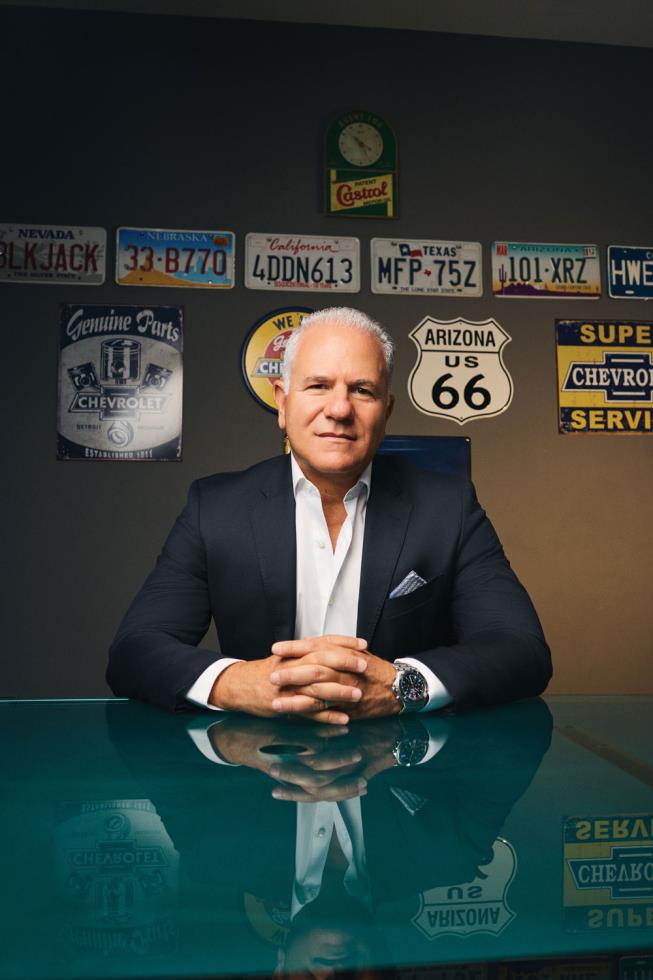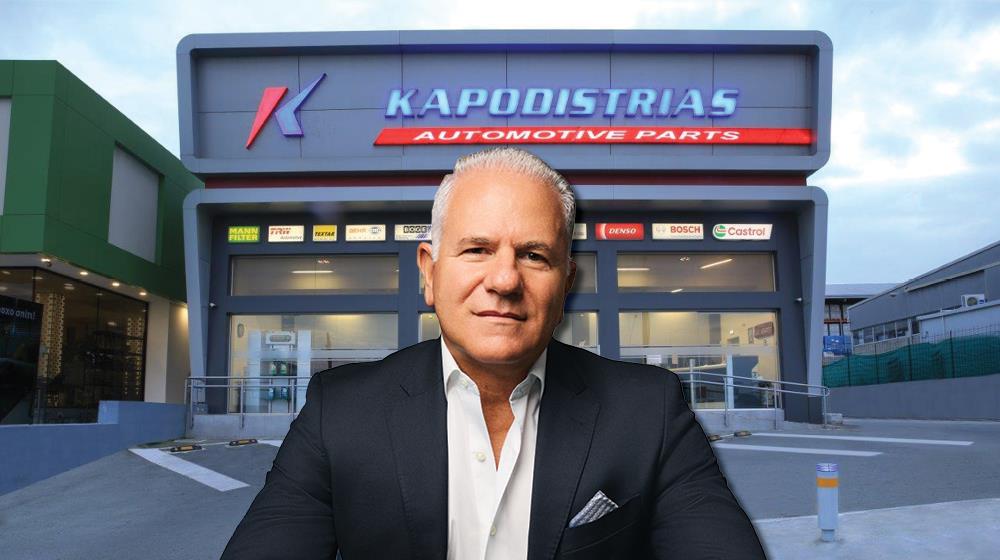“I don't think electric vehicles are the future of automotive mobility,” Constantinos Kapodistrias, the CEO of Chr. Kapodistrias & Sons suggests, elaborating, “They may prevail in some countries, such as China, but that doesn't necessarily mean they are the future for the planet.”
“So, what does the future hold?,” the expert continues in a recent interview, “The future holds technological neutrality, or if you prefer, technological pluralism, where different technologies will coexist and everyone will be able to choose what they prefer. You will be able to buy a latest-technology internal combustion car (meaning petrol or diesel), electric, hybrid, hydrogen, etc, without anyone imposing a specific technology on you.”
Kapodistrias also talks about the most significant challenges facing the automotive aftermarket sector today, at both a local and international level and discusses the secrets of success in keeping a family business like Chr. Kapodistrias & Sons Ltd both dynamic and competitive.
In addition, the CEO shares his personal philosophy as a business leader, opening the door on his decision-making process.
In your opinion, what are the biggest challenges facing the automotive aftermarket sector in Cyprus and internationally today?
The Independent Automotive Aftermarket sector in Cyprus and internationally faces significant challenges due to rapid technological developments in vehicles, such as the spread of hybrid and electric cars, which require specialised knowledge and equipment for their maintenance. At the same time, the lack of specialised personnel and the need for continuous training of technicians are critical issues for many repair shops and companies in the field.
Another challenge is vehicle connectivity with the manufacturer/dealer, which is changing the landscape of diagnostics and fault prevention, requiring advanced diagnostic tools and access to data controlled by manufacturers and dealers. Independent repair shops do not have easy access to this data.
In addition, distribution channels are being transformed by the rapid growth of e-commerce and digital platforms, which are changing the way spare parts and services are made available, although this is more prevalent abroad.
Finally, human resources are a critical factor: the lack of skilled technicians and the need for new skills (in new technologies, software, telematics), as well as talent in the field of spare parts, are creating pressures and challenges in the Independent Automotive Aftermarket.
You have publicly expressed your disagreement with the transition to electric vehicles. What are the main reasons for this position?
I disagreed with the political approach to the whole issue, namely the fact that decrees, taxes, subsidies, legislation, propaganda narratives, etc, were used to impose electric mobility in their own way. I don't want to be misunderstood. I am not against electric vehicles as a technology. It would be unfortunate for anyone to reject any technology. I simply disagreed with the way they came to impose it, while at the same time not presenting us with all the facts. On a daily basis, I talk to several manufacturers of automotive systems and components that are first-equipment suppliers to the automotive industry, and we also meet at various conferences and meetings abroad. These are the manufacturers involved in the construction of a car, whether it is electric, hybrid, or internal combustion. Some of them are Bosch, Schaeffler, TMD Friction, ZF, Brembo, Elring, and others. From my position, I am in a better place than many others in Cyprus to know the facts and realities. The reality is not what politicians, especially in the European Union, have presented. Politicians tried to impose a specific technology, while rejecting others. Electric mobility was not the natural evolution of the automotive industry; it was simply a technology. And it was used as a technology by politicians, not by the automotive industry.
Electric vehicles are being promoted as the future of automotive mobility. What do you think the future really holds in this sector? Where is the technology heading?
I don't think electric vehicles are the future of automotive mobility. They may prevail in some countries (such as China), but that doesn't necessarily mean they are the future for the planet. So, what does the future hold? The future holds technological neutrality, or if you prefer, technological pluralism, where different technologies will coexist and everyone will be able to choose what they prefer. You will be able to buy a latest-technology internal combustion car, electric, hybrid, hydrogen, etc, without anyone imposing a specific technology on you.
Why do electric vehicles remain significantly more expensive, and what do you believe are the real factors behind this?
The cost of electric vehicles (EVs) remains significantly higher mainly due to the cost of lithium-ion batteries, which are the most expensive component in an EV. Although battery prices have fallen in recent years, they continue to be affected by the prices of raw materials (lithium, cobalt, nickel), demand, and geopolitical instability.
In addition, other important factors include manufacturers' high investments in new technologies, production infrastructure, and research and development; the still limited production volume, which does not allow for full exploitation of economies of scale; and tariffs or subsidies that vary from country to country.

If a consumer asked you today what vehicle to buy, what advice would you give them? What factors should be taken into account?
Personally, I would advise them to buy a mild-hybrid or new-technology internal combustion engine car (petrol or diesel). This is, of course, purely my personal preference and only applies to today. I am not implying anything else, nor am I disparaging any other technology. If you ask me the same question in three or five years, my answer may be different.
Is the fact that the majority of people buy used cars instead of new ones something that should concern us, especially given that the fleet of vehicles on Cypriot roads is one of the oldest in the EU?
This should not be a cause for concern, as long as these used cars are not too old. Cars that are 4-6 years old are fine. However, if someone buys a car that is 10 years old or older, then this entails more risk in terms of vehicle maintenance, etc. The average age of vehicles in Cyprus is estimated to be around 14-15 years. There are European countries where it is even higher, such as Greece. It would certainly be better if it were around 11-12 years. It is extremely difficult to lower the average age further.
Since you do not consider electric vehicles to be a viable solution for the future, what technology or model of mobility do you think has potential?
It is difficult to predict. However, any technology that is more environmentally friendly and affordable will have good prospects. This technology may be more than one, i.e., there may be two or three technologies simultaneously.
How do you assess the Cypriot market in relation to international developments? Do you think we are ready for the changes that are coming?
The Cypriot market has its own particularities, which must always be taken seriously into account when changes are imminent. A specific policy cannot be adopted blindly because, for example, it was done in Sweden or Poland. Local particularities must always be taken into account and appropriate adjustments made. Therefore, we are ready in some areas, but not in others. It depends on the case.
Kapodistrias has a wide range of products and partnerships with international brands. What is the strategy behind your choice of partners?
Our general strategy is to collaborate with leading Original-Equipment (OE) manufacturers, but at the same time to offer spare parts of comparable quality from other reliable manufacturers that may not be Original-Equipment manufacturers. This is done so that we can offer cheaper spare parts to serve consumers of all financial means and needs.
Your company is a strong family business. In your opinion, what are the secrets that keep a family business dynamic and competitive?
I wouldn't call them "secrets." I would describe them as "ingredients" for success. Some of these are—among many others—the excellent relationship between the owners of the family business, the philosophy and culture of the company that starts with the owners and managers, staffing with capable individuals, careful planning, the right professionalism, order, and discipline at all levels of the business.
What are the next steps for Kapodistrias Automotive? Are there any new plans, expansions, or innovations we can expect?
Construction work on the large central warehouse in the Idalion industrial area will begin after the summer. Then, construction of the new Larnaca store will begin. In 2026, our company's new ERP software will also be implemented. Over the next 3-4 years, starting today, we will see huge changes in our company.
What aspects of your character do you think have contributed most to your business career and the success of the company?
My composure in some very difficult and sudden circumstances, the philosophy and professional culture I adopted from the influences I had during my studies in the US, the communication skills I demonstrated on several occasions, my ability to connect with important partners, my insight in making decisions at key moments, my optimism that everything will turn out well, as well as my non-confrontational nature with my colleagues, were some very important factors that helped me greatly in my professional career and contributed in turn to the overall success of the company.
What is your philosophy as a leader and what is your personal compass when making important decisions?
My main philosophy is respect for people, colleagues, and employees. Be simple and approachable with the right attitude, regardless of who you are dealing with. When I make important decisions, I try to think through all the consequences, all the possible negatives.
When it comes to commercial decisions, I never think about profit. I always say to myself: "If what I do is successful and works properly, then any profit will come naturally."









